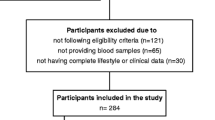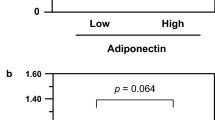Abstract
Background: Adiponectin is thought to play a significant role in the development of both insulin resistance and metabolic syndrome. Yet, there is very few evidence about the association plasma adiponectin and metabolic syndrome in the prospective study. Adiponectin exists as multimers in serum, and high-molecular-weight (HMW) adiponectin is particularly considered to be the active form of the protein. Aim: We investigated whether serum HMW adiponectin as well as total adiponectin is associated with the development of metabolic syndrome in a longitudinal study. Subjects and methods: We enrolled 224 men and 312 women of Japanese-Americans without metabolic syndrome at baseline who were followed for an average of 3.2 yr. The association of plasma total and HMW adiponectin with a progression to metabolic syndrome was examined. Results: Subjects who developed metabolic syndrome had significantly lower plasma total and HMW adiponectin levels at baseline than those who did not develop metabolic syndrome. In a Cox proportional hazards model, lower total and HMW adiponectin levels were independent risk factors for the development of metabolic syndrome after adjusting for age, body mass index, classification of 75-g glucose tolerance test, and homeostasis model assessment (hazards ratio: total, 0.684, p=0.017, in men; 0.606, p=0.003, in women; HMW, 0.687, p=0.014, in men; 0.704, p=0.029, in women, respectively). Conclusions: Low circulating levels of total and HMW adiponectin may be a possible predictor for the development of metabolic syndrome.
Similar content being viewed by others
References
Maeda K, Okubo K, Shimomura I, Funahashi T, Matsuzawa Y, Matsubara K. cDNA cloning and expression of a novel adipose specific collagen-like factor, apM1 (AdiPose Most abundant Gene transcript 1). Biochem Biophys Res Commun 1996, 221: 286–9.
Yang WS, Lee WJ, Funahashi T, et al. Plasma adiponectin levels in overweight and obese Asians. Obes Res 2002, 10: 1104–10.
Yamamoto Y, Hirose H, Saito I, et al. Correlation of adipocyte-derived protein adiponectin with insulin resistance index and serum high-density lipoprotein-cholesterol, independent of body mass index, in the Japanese population. Clin Sci (Lond) 2002, 103: 137–42.
Ryo M, Nakamura T, Kihara S, et al. Adiponectin as a biomarker of the metabolic syndrome. Circ J 2004, 68: 975–81.
Santaniemi M, Kesäniemi YA, Ukkola O. Low plasma adiponectin concentration is an indicator of the metabolic syndrome. Eur J Endocrinol 2006, 155: 745–50.
Matsushita K, Yatsuya H, Tamakoshi K, et al. Comparison of circulating adiponectin and proimflammatory markers regarding their association with metabolic syndrome in Japanese men. Arterioscler Thromb Vasc Biol 2006, 26: 871–6.
Waki H, Yamauchi T, Kamon J, et al. Impaired multimerization of human adiponectin mutants associated with diabetes. Molecular structure and multimer formation of adiponectin. J Biol Chem 2003, 278: 40352–63.
Pajvani UB, Du X, Combs TP, et al. Structure-function studies of the adipocyte-secreted hormone Acrp30/adiponectin. Implications for metabolic regulation and bioactivity. J Biol Chem 2003, 278: 9073–85.
Aso Y, Yamamoto R, Wakabayashi S, et al. Comparison of serum high-molecular weight (HMW) adiponectin with total adiponectin concentrations in type 2 diabetic patients with coronary artery disease using a novel enzyme-linked immunosorbent assay to detect HMW adiponectin. Diabetes 2006, 55: 1954–60.
Hara K, Horikoshi M, Yamauchi T, et al. Measurement of the high-molecular weight form of adiponectin in plasma is useful for the prediction of insulin resistance and metabolic syndrome. Diabetes Care 2006, 29: 1357–62.
Nakashima R, Kamei N, Yamane K, Nakanishi S, Nakashima A, Kohno N. Decreased total and high molecular weight adiponectin are independent risk factors for the development of type 2 diabetes in Japanese-Americans. J Clin Endocrinol Metab 2006, 91: 3873–7.
The Expert Committee on the Diagnosis and Classification of Diabetes Mellitus. Report of the Expert Committee on the Diagnosis and Classification of Diabetes Mellitus. Diabetes Care 1997, 20: 1183–97.
Grundy SM, Cleeman JI, Daniels SR, et al; American Heart Association, National Heart, Lung, and Blood Institute. Diagnosis and manegement of the metabolic syndrome. Circulation 2005, 112: 2735–52.
Matthews DR, Hosker JP, Rudenski AS, Naylor BA, Treacher DF, Turner RC. Homeostasis model assessment: insulin resistance and β-cell function from fasting plasma glucose and insulin concentrations in man. Diabetologia 1985, 28: 412–9.
Kern PA, Di Gregorio GB, Lu T, Rassouli N, Ranganathan G. Adiponectin expression from human adipose tissue: relation to obesity, insulin resistance, and tumor necrosis factor-alpha expression. Diabetes 2003, 52: 1779–85.
Lindsay RS, Funahashi T, Hanson RL, et al. Adiponectin and development of type 2 diabetes in the Pima Indian population. Lancet 2002, 360: 57–8.
Tabara Y, Osawa H, Kawamoto R, et al. Reduced high-molecular-weight adiponectin and elevated high-sensitivity C-reactive protein are synergic risk factors for metabolic syndrome in a large-scale middle-aged to elderly population: the Shimanami Health Promoting Program Study. J Clin Endocrinol Metab 2007, 93: 715–22.
Seino Y, Hirose H, Saito I, Itoh H. High-molecular-weight adiponectin isa predictor of progression to metabolic syndrome: a population-based 6-year follow-up study in Japanese men. Metabolism 2009, 58: 355–60.
Tankó LB, Bruun JM, Alexandersen P, et al. Novel associations between bioavailable estradiol and adipokines in elderly women with different phenotypes of obesity: implications for atherogenesis. Circulation 2004, 110: 2246–52.
Xu A, Chan KW, Hoo RL, et al. Testosterone selectively reduces the high molecular weight form of adiponectin by inhibiting its secretion from adipocytes. J Biol Chem 2005, 280: 18073–80.
Kubota N, Terauchi Y, Yamauchi T, et al. Disruption of adiponectin causes insulin resistance and neointimal formation. J Biol Chem 2002, 277: 25863–6.
Maeda N, Shimomura I, Kishida K, et al. Diet-induced insulin resistance in mice lacking adiponectin/ACRP30. Nat Med 2002, 8: 731–7.
Egusa G, Watanabe H, Ohshita K, et al. Influence of the extent of westernization of lifestyle on the progression of preclinical atherosclerosis in Japanese subjects. J Atheroscler Thromb 2002, 9: 299–304.
Hanson RL, Imperatore G, Bennett PH, Knowler WC. Components of the “metabolic syndrome” and incidence of type 2 diabetes. Diabetes 2002, 51: 3120–7.
Li S, Shin HJ, Ding EL, van Dam RM. Adiponectin levels and risk of type 2 diabetes: a systematic review and meta-analysis. JAMA 2009, 302: 179–88.
Hara K, Boutin P, Mori Y, et al. Genetic variation in the gene encoding adiponectin is associated with an increased risk of type 2 diabetes in Japanese population. Diabetes 2002, 51: 536–40.
Dzau VJ, Bernstein K, Celermajer D, et al. Pathophysiologic and therapeutic importance of tissue ACE: a consensus report. Cardiovasc Drugs Ther 2002, 16: 149–60.
Sakamoto K, Sakamoto T, Ogawa H, et al. The effect of 6 months of treatment with pravastatin on serum adiponectin concentrations in Japanese patients with coronary artery disease and hypercholesterolemia: a pilot study. Clin Ther 2006, 28: 1012–21.
Sugiyama S, Fukushima H, Kugiyama K, et al. Pravastatin improved glucose metabolism associated with increasing plasma adiponectin in patients with impaired glucose tolerance and coronary artery disease. Atherosclerosis 2007, 194: 43–51.
Oki K, Koide J, Nakanishi S, Nakashima R, Yamane K. Fenofibrate increases high molecular weight adiponectin in subjects with hypertriglycedemia. Endocr J 2007, 54: 431–5.
Fasshauer M, Klein J, Neumann S, Eszlinger M, Paschke R. Adiponectin gene expression is inhibited by beta-adrenergic stimulation via protein kinase A in 3T3-L1 adipocytes. FEBS Lett 2001, 507: 142–6.
Author information
Authors and Affiliations
Corresponding author
Rights and permissions
About this article
Cite this article
Nakashima, R., Yamane, K., Kamei, N. et al. Low serum levels of total and high-molecular-weight adiponectin predict the development of metabolic syndrome in Japanese-Americans. J Endocrinol Invest 34, 615–619 (2011). https://doi.org/10.3275/7409
Accepted:
Published:
Issue Date:
DOI: https://doi.org/10.3275/7409




